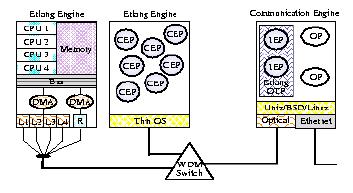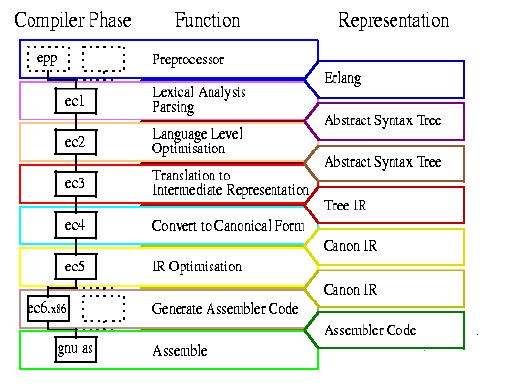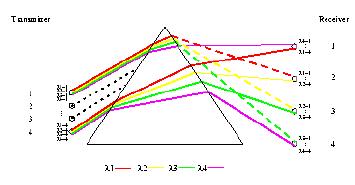- Dr Lawrie Brown
- UNSW@ADFA, Canberra
- work started on sabbatical at SERC, RMIT in S2 2002
- continued during summer visits to School of Network Computing, Monash Uni
- Erlang - a functional, distributed language
- for robust, reliable, distributed, near real-time applications
- EC - an Erlang compiler to native code
- for Magnus massively scaleable computing platform
- as testbed for safe Erlang mobile code extensions
- ecrt - a runtime for EC
- using detached system pthreads, dlopen, GC
- is a functional language
- dynamically typed, symbolic data representation
- single assignment to variables
- uses pattern matching for variable binding & function selection
- minimal side-effects simplifies code analysis & testing
- has extremely cheap and efficient process spawning
- and suppport for robust distributed applications
- developed by Ericsson Computer Science Labs, Stockholm
- focus is on soft, real-time, distributed systems
- full system (compilers, app support) released as Open Source Erlang
- result of previous research work (SSP97 @ SERC/NTNU/CSL)
- improve support for safe mobile code execution by providing
- controlled access to processes and external resources (ports) - capabilities
- custom world-view - hierarchy of (sub)nodes
- remote code loading in context
- successfully trialed in a prototype in Erlang
- now must be implemented in production system
- Concurrency
- Distribution
- Robustness
- Soft real-time response
- Hot code upgrade
- Incremental code loading
- External interfaces
These are some of the key features needed in Erlang to support robust, reliable, distributed, near real-time applications.
Echo = spawn(echo,loop,[]),
Echo ! {self(),"Here is a message"},
....
loop() ->
receive
{From,Msg} -> From ! Msg, loop()
end.
....
Echo = spawn(SomeNode,echo,loop,[]),
....
Word = string:sub_word(" Hello old boy !",3),
apply(io,write,[Word]),
These code fragments illustrate: process spawn, nb return of pid then used to send message to new process; the echo deamon code; remote spawn as easy as local; runtime binding of code refs.
- current main Erlang implementation
- internally threaded interpreter for BEAM machine
- robust, excellent development
- reasonable speed, limited by being an interpreter
- internal runtime code complex, not well documented
- HiPE - High-Performance Erlang
- native code compiler for X86 & SPARC
- developed by Uppsala Uni
- links to existing OSE interpreter/runtime
- ETOS - Erlang to Scheme
- converts Erlang to Scheme
- then use Gambit Scheme Compiler to generate C
- currently incomplete, has proprietary licence
- Gerl - Geoff's Erlang
- compile large subset of Erlang into C++
- semantic incompatibilities wrt to C++ (esp call conventions)
- closest to whats desired but has limitations

Magnus a proposal is to develop a massively scaleable computing platform based on parallel computation using message passing & non-blocking interconnect based on WDM passive optical switch & DMA speed data transfers.
- want a full enencumbered portable compiler
- for use as core compiler for Magnus
- and as testbed for safe Erlang extensions
- developed by Maurice Castro, SERC, RMIT
- compiles most of Erlang language to x86 BSD/Linux targets
- integrates with runtime to implement BIFs, concurrency,
message passing, distribution, garbage collection
(nb 1 module, 1500 lines C, 72 entry points)
Sketch history of EC and links to Magnus proposal.

